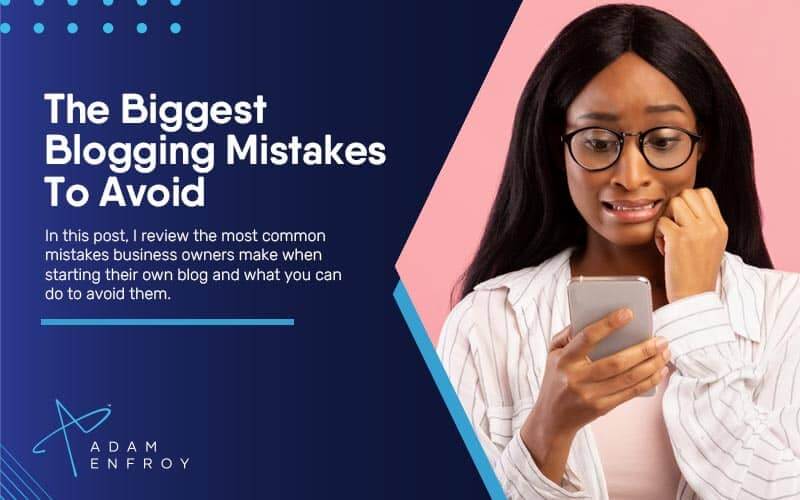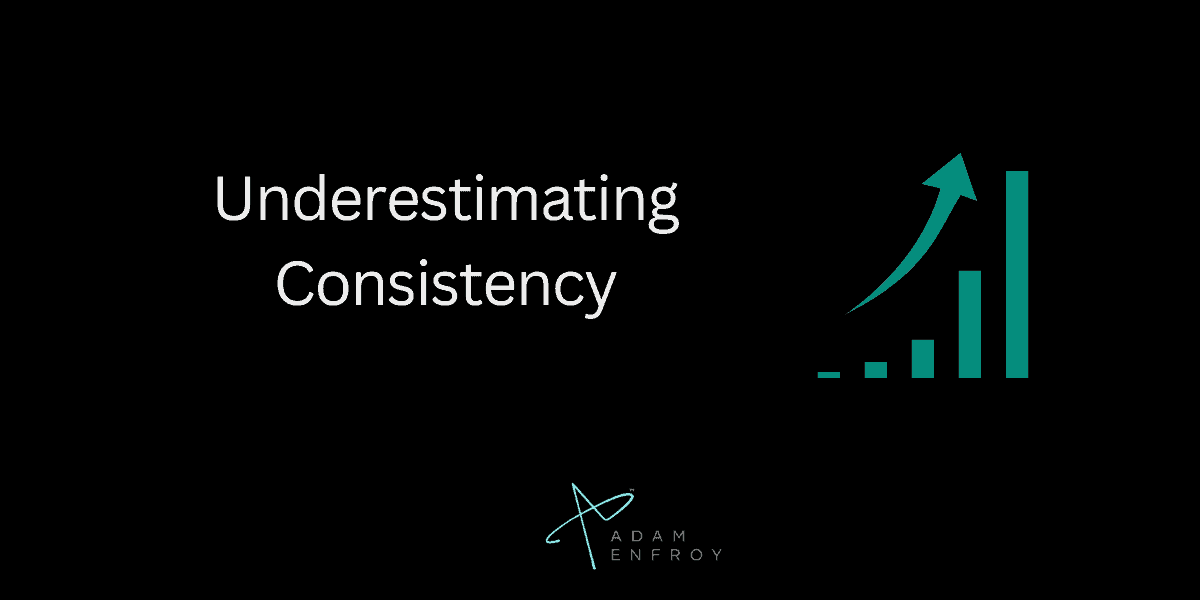The Biggest Blogging Mistakes To Avoid In 2024

Blogging – one of my favorite topics in the whole world.
It’s like the bread to my butter, the chalk to my cheese, or more aptly, the SEO to my keyword research and optimization.
And let’s face it, who doesn’t love a good metaphorical sandwich now and then?
But let’s be honest, as much as I adore blogging, it can be a lot like navigating an obstacle course in the dark – thrilling but full of unexpected trips and falls.
Especially when those ‘unexpected trips and falls’ translate into big blogging mistakes that can turn a promising blog into a digital ghost town.
In this post, I’ll review the most common mistakes business owners make when starting their own blog and what you can do to avoid them.
Not Having A Blogging Niche

Finding your niche is an essential part of building a successful blog.
It means finding a specific topic or area to write about that you are passionate about and knowledgeable about.
That said, one of the lessons I wish I knew before starting my blog is that passion will only take you so far.
Instead, there are other (equally important) factors to consider.
Moreover, by focusing on your niche, you can establish yourself as an expert in that field and build a loyal following of interested readers.
Your blog will become a go-to resource, and your readers will have clear expectations of what to expect from your content.
One of the benefits of focusing on a niche is that it can help you stand out in a crowded blogging market.
With millions of blogs, it’s crucial to differentiate yourself from the competition.
Writing about a specific topic makes you more likely to appeal to a particular audience and have less competition within that niche.
It helps your readers notice your blog, which improves your chances of building a loyal following.
Another benefit of having a niche blog is that it can help you establish your authority and build your brand.
When people see you as an expert in your field, they’re more likely to trust your opinions and seek your advice, which can lead to great opportunities like sponsored content, collaborations, and speaking engagements.
The more you establish yourself as a niche blogger, the more likely people will recognize you as a leader in your industry.
If you’re unsure how to find your niche, start by thinking about what topics interest you and what you’re knowledgeable about.
Research your competitor blogs and see what they’re writing about.
Look at what topics are trending in your field on social media platforms like Twitter and Facebook.
Once you’ve found a few topics, narrow them down to the one you’re most passionate about and explore them more.
Not Using CTAs As A Secret Weapon
If you’re a blogger, you know how challenging it is to engage your readers.
Nowadays, people’s attention span is shorter than ever, meaning it’s easy to bounce from one website to another without thinking twice.
That’s where CTAs, or Call-to-Actions, come into play.
Every blogger has specific goals for their website.
Some aim to gain more subscribers and increase social media engagement, while others focus on selling more products.
CTAs can help you achieve these goals by directing your readers to take action.
For example, if you’re trying to get more subscribers, you can add a CTA at the end of your post telling your readers to subscribe to your newsletter.
You’ll provide value to your readers and still achieve your goals.
Going Into Excessive Personal Stories
Whether you’re writing a formal article, a blog post, or a personal essay, it’s essential to use stories and comparisons effectively.
Personal stories can add a touch of humanity to your writing when you do them well.
Readers enjoy connecting with writers on a personal level.
However, you can overuse stories if you go into too much detail or include unnecessary comparisons.
For example, don’t spend several paragraphs talking about the struggles of your own life while writing a blog post on marketing techniques.
Likewise, don’t spend several paragraphs comparing yourself to someone else when writing a personal essay.
The first and most important tip for avoiding excessive personal stories and comparisons is to focus on your central point.
Make sure that your message is clear and concise.
Keep in mind that readers are looking for easy-to-digest information.
Present your argument using logical and organized examples.
Real-life scenarios can be a powerful tool for supporting your central point.
However, it is essential to use them sparingly.
Avoid getting bogged down in the details of any particular scenario, as this can detract from your main point.
Instead, use real-life examples to illustrate your argument and support your claims.
If you absolutely must include some personal stories, be sure to keep them relevant.
Ensure they tie back to your central point and support your argument.
Not Offering Resources
One way to increase your content value is by adding resources.
Resources could include links to tools, templates, books, or other blogs relevant to the topic.
For example, writing an article on “How to Start a Blog” and including links to resources on web design or website creation tools.
Providing helpful and value-adding resources for your readers makes them consider becoming regular followers.
Not Considering Working With Freelancers
Successful content creation demands a deep understanding of the target audience, the niche, the purpose, and posting frequency.
Writing blogs your audience wants to read is not an easy feat.
It can be challenging to keep up with different topics.
A freelancer who specializes in your niche can be your savior.
They can help you identify your target audience’s needs and preferences, define your unique selling proposition, and devise a content calendar that resonates with your readers.
They can also help you stay on top of the latest trends and optimize your content for search engines.
By working with a freelancer, you ensure that the content on your blog is relevant, engaging, and up-to-date.
Hiring a freelancer can bring quality content to your blog.
Sometimes even experienced writers need a second opinion or feedback on their writing.
Freelancers can provide valuable feedback on your writing, suggest edits and improvements, and provide guidance on developing your writing skills.
They can also help you produce high-quality content by researching, fact-checking, and proofreading your articles.
Similarly, they can write blog posts and create custom content for you, creating original pieces that resonate with your readers and meet your business objectives.
Freelancers also stay on top of the latest trends and best practices in blogging and digital marketing, ensuring your blog stays fresh and relevant.
Failing To Track Your Progress

One of the most significant advantages of tracking your website’s progress is gaining insight into how your website is performing.
With analytics tools like Google Analytics, you can see how much traffic your website gets, how your visitors interact with it, how long they stay on your pages, and what content they engage with.
Armed with this information, you can make informed decisions to optimize your site’s user experience, refine your overall content strategy, and enhance your site’s conversion rate.
The success of your website lies in how well it serves your target audience.
By tracking your progress, you can better understand what content on your website resonates with your audience.
You can see which pages they visit the most, which pages they leave immediately, and which pages convert visitors into customers or clients.
Such information helps you create more targeted content optimized for your specific audience, helping to foster deeper connections with your customers and prospects.
Websites are not the only means of online marketing; social media and email marketing are critical to your overall online strategy.
It’s essential to track the performance of your social media posts and email marketing campaigns to see what’s working and what’s not.
This information can help refine your strategy, create more impactful campaigns, and ensure you hit your key performance indicators.
Not Looking At Competitors
As a blogger, you can look at the types of content your competitors produce, their tone, and their style to understand what works well for your market.
However, don’t cross the line with plagiarism.
One of the best things you can learn from your competitors is what they’re doing right.
Look closely at their blogs, social media accounts, and online presence.
Check what resonates with audiences.
Are there particular blog posts that are getting more shares, likes, and comments?
Use this information to your advantage but make sure to give your content a unique spin.
On the other hand, copying your competitors’ blog posts is plagiarism and illegal.
It can also harm your business reputation and search engine optimization (SEO) ranking, potentially leading to legal issues.
Plagiarism doesn’t only mean duplicating content word for word.
If you copy sentences, phrases, or even the structure of the original content, it’s still plagiarism.
So, rather than copying and pasting the entire article, take ideas and inspiration from it and add your twist.
Instead of copying your competitors’ blog posts, use them as a starting point for your content.
Focus on what is changing and the industry conversations, then share your point of view.
You can take an opposing view to your competition or offer a different perspective.
Ensure you create informational, valuable, and entertaining content that resonates with your audience.
Not Making Your Blog Stand Out
When you publish blog content, you represent your brand.
Poorly written content with spelling and grammar errors can damage your online reputation and make it hard for people to take you seriously.
There are several writing styles.
Choosing the best style for your brand and your target audience is essential.
For example, the writing style of a beauty blogger would be different from that of a financial blogger.
A beauty blogger might use a more conversational tone, while a financial blogger might use a more technical and formal tone.
The most crucial step in ensuring high-quality content is proper proofreading.
It’s crucial to read over your content several times and look for spelling and grammar errors.
You can also try using proofreading software like Grammarly to help you correct any mistakes automatically.
Not Understanding Your Audience

One mistake new bloggers make is not understanding what their audience needs.
You need to know what your audience seeks regarding information, solutions to problems, and what they want to achieve.
You can research your readers’ needs by following online communities, forums, and social media groups relevant to your topic.
You’ll gain valuable insights into your audience’s challenges, and you can create content that addresses those specific pain points.
When you try to write for everyone, you write for no one.
Creating content that’s too broad is another common mistake bloggers make.
It’s essential to be specific to cater to a particular audience.
For example, if you’re writing about health and fitness, you could specialize in a particular country, age group or fitness level.
Focusing on a specific sub-niche will help build a core readership.
Blogging is a two-way dialog, and you need feedback from your readers.
Ignoring feedback is one of the worst mistakes bloggers can make, as it shows that you don’t value or understand your audience.
Listen to your readers, answer their questions, and consider their feedback.
Also, monitor your comments section, social media profiles, and emails.
Responding to feedback strengthens your relationship with your readers and helps you produce the content they need.
Not Addressing Customer Questions In Blogging
As a business owner, you want to make sales, and customers want answers before purchasing from you.
Customers have questions related to your products or services, and by answering these questions, you can convert them into loyal customers.
Addressing their queries in your blog posts can help customers overcome any doubts about your products, which can result in a successful sale.
You can also create a dedicated FAQ page on your website to help provide answers to frequently asked questions and save your customers time.
Your sales team is aware of customers’ questions when interacting with them.
Leveraging this insight can go a long way in creating relevant blog post topics.
By asking your sales team to provide a list of customer inquiries, you can analyze the questions, which can help you understand what your potential customers are looking for.
It’s an excellent way to tailor your content and answer your readers satisfactorily.
With experience and industry expertise, bloggers can anticipate customer questions and deliver the perfect topics that resonate with readers.
Anticipation can also offer insights into potential customer pain points, providing a window of opportunity to address these with blog content.
A great way to anticipate customer questions is to use social media and other means of communication to find out more about your customers, their needs and preferences.
Not Boosting Your Blog Traffic With SEO

Improving your blog’s SEO is one of the most effective ways to attract more readers.
If you’re unsure where to start, here are essential blogging tips for boosting your traffic:
Optimize Your Blog Headlines
One of the most critical aspects of your blog post is the headline.
It’s the first thing your readers will see, and it will entice them to click and read more.
Your headline should be attention-grabbing, informative and include relevant keywords.
When you’re crafting your headline, think about the user search intent.
People search for specific information, so your headline reflects their search intent.
Use Relevant Keywords
Including relevant keywords in your blog post is essential to making it searchable on search engines.
Use tools like Google Keyword Planner to help you find the relevant keywords for your content.
But use them appropriately.
Stuffing your blog post with keywords can harm your rankings and upset your readers.
Include Internal And External Links
Another way to optimize your blog for SEO is to include internal and external links within your posts.
Internal linking keeps readers engaged with your site, and external linking builds authority.
The key here is to link to high-quality sources and avoid spammy links that can harm your rankings.
Optimize Your Post Urls
Your post URLs should be easy to read, remember and understand what the blog post is all about.
Use hyphens between words to divide them and help the search engines understand what’s in the URL.
A well-optimized URL will help people click on your link in the search results since they can tell what the post is about.
Write For Readers And Search Engines
As mentioned before, writing for both readers and search engines is essential.
While optimizing for search engines, remember that your blog is for human beings.
So while using relevant keywords in your post, ensure your writing is clear, engaging and helpful.
Write content that answers readers’ questions and solves problems.
Neglecting The Power Of Social Media
Social media marketing has become an integral part of any effective marketing strategy.
You cannot underestimate the power of social media channels, especially if you’re a newbie embarking on your blogging journey.
However, it is surprising how common it is to overlook the importance of social media when writing blog posts.
Neglecting social media can be one of the biggest mistakes that bloggers make.
LinkedIn is a valuable platform for promoting blog content as it is a professional networking site where bloggers can network with potential readers, influencers, and other bloggers in their niche.
Guest posts are another effective way of leveraging social media channels to reach a wider audience and build backlinks.
Engaging with readers on social media is equally important, as it builds loyalty and contributes to the long-term success of a blog.
Failing to leverage influencers and blogger networks can hinder growth, as these networks can provide valuable exposure to a broader audience.
Ultimately, bloggers need to recognize the power of social media when developing their marketing strategy to ensure the success of their blogging journey.
Underestimating The Importance Of Consistency

Consistency is a crucial component of successful blogging.
Underestimating its importance can lead to declining traffic and engagement on your blog.
To ensure consistency, create an editorial calendar that includes publishing frequently and planning your new blog post ideas.
As a blogging beginner, you can also use content marketing tools to help you generate blog topics that align with your niche and brand voice.
Additionally, don’t overlook regular website updates and maintenance.
You can achieve this by using a WordPress plugin to ensure your website runs smoothly and choosing a domain name that accurately represents your brand.
By prioritizing consistency in your blogging efforts, you can establish a loyal following and increase your credibility in the blogging world.
Ignoring The Role Of Visuals In Blogging
In today’s content-heavy online world, visuals play an integral role in creating a good blog post.
As bloggers and content marketers, we should always strive to offer something new and exciting to our audiences.
In addition to well-written articles, incorporating visuals can elevate our content to a whole new level.
One powerful visual tool is the use of infographics.
By presenting data and information appealingly, infographics can make long-form content more engaging and shareable.
Subheadings in blog posts are also an essential aspect of visual appeal, as they break up lengthy text and make the content more readable.
Neglecting the potential impact of video content is also a huge mistake, as it’s becoming an increasingly popular way for people to consume content.
Similarly, podcasts are another form of content marketing that can add an extra dimension to a blog.
Ultimately, incorporating visuals into our content can help keep our audiences engaged and make blog posts stand out.
Lacking A Comprehensive Monetization Strategy
One of the biggest mistakes that can hinder the success of a blog is lacking a comprehensive monetization strategy.
While creating a profitable blog takes time and effort, it may never become a full-time income source without a clear and effective way to make money.
Digital marketing strategies, such as affiliate marketing and sponsored posts, can diversify revenue streams and increase profits.
Relying solely on ads for revenue may not be enough to sustain a business blog in the long term.
Not exploring different monetization methods, such as creating an email list and leveraging affiliate partnerships, can limit the potential for blog earnings.
To avoid these mistakes, have a well-thought-out blog strategy with various monetization strategies for maximum profitability.
Wrap Up.
By considering the above common blogging mistakes and following the tips mentioned, you can improve your blog posts, making them more reader-friendly and SEO-friendly.
Remember to thoroughly research your topics, use relevant keywords, link internally and externally, optimize post URLs and write for readers and search engines.
While any blogging platform can help you create new content that can drive traffic to your blog, focusing on the right monetization strategy can help you maximize the potential for blog earnings.
Further reading on AdamEnfroy.com: Want a great step-by-step to starting blogging?
You can also check out this guide to learn how to become a successful content creator.





